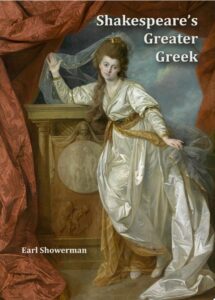Earl Showerman’s book has just been published!

Earl’s book entitled Shakespeare’s Greater Greek has just been published and can be found here.
Over the past century, Ben Jonson’s First Folio reference to Shakespeare’s “small Latin and lesse Greek” has led literary scholars to conclude that Shakespeare used English or Latin translations of Seneca, Plutarch, and Ovid as sources for his dramatic adaptations from Greek myth. The untranslated dramas of Aeschylus, Sophocles, Euripides, and Aristophanes were rarely considered to be primary sources.
Shakespeare’s Greater Greek sets forth the extensive literary and historical evidence demonstrating the profound influence of these previously excluded Greek dramas on Shakespeare’s comedies and tragedies, with fresh analyses of: Hamlet, Macbeth, Timon of Athens, Titus Andronicus, The Winter’s Tale, Pericles, Prince of Tyre, Much Ado About Nothing, and A Midsummer Night’s Dream.
The playwright’s knowledge of untranslated Greek sources directly challenges the claim of authorship made on behalf of the gentleman from Stratford, and supports the attribution of these works to Edward de Vere, 17th Earl of Oxford, who studied the Greek Bible, attended the Greek church in Venice, and collected and sponsored translations of classical Greek editions. The recent discovery of de Vere’s annotations in both Latin and Greek handwriting in Greek editions of Roman history at the Audley End Library in Essex, England, provides clear proof of Oxford’s Greek fluency and his potential involvement in the creation of the Shakespeare canon.
Recognizing Greek drama, history, and epic as Shakespeare sources has profound implications, not only as newly acknowledged literary sources, but also reflecting critically in support of an author deeply indebted to the Greek example.
Membership dues cover only a fraction of our budget, including all our research, preservation and programming. Please support the SOF by making a gift today!
Blue Boar Tavern: Wassail Q&A
Tuesday Dec. 17, 8pm E / 5pm P
Sign up below for event invites!
